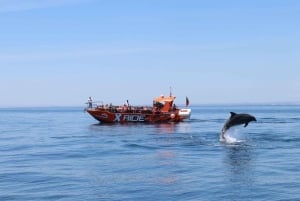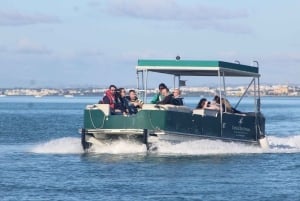UK Pensions - 5 Things Expats in Portugal should know
insights by Blevins Franks
Book Top Experiences and Tours in Algarve:
If youʻre booking your trip to Algarve last minute, we have you covered. Below are some of the top tours and experiences!- Portimão: Benagil Caves Speed Boat Tour with Sunset Option
- Albufeira: Full-Day Buggy Tour with Lunch
- Faro: Ria Formosa Natural Park Segway Tour & Birdwatching
- Algarve: Horse Riding Beach Tour at Sunset or Morning
- From Albufeira: Half-Day Off-Road Quad Tour
Blevins Franks provides expert wealth management advice on cross-border tax issues, estate planning, pensions and investments to their clients in Portugal and across Europe. In the article below, Sharon Farrell, Blevins Franks partner, outlines some key things that UK expats in Portugal should understand about UK pensions. While tempting to go it alone, expert advice can help save you money, and give you peace of mind.
Find out more about Blevins Franks
UK pensions – 5 key things British expatriates in Portugal need to understand
By Sharon Farrell, Partner, Blevins Franks
This article was originally published by Blevins Franks
Pensions is a topic dear to all our hearts. It represents a lifetime of professional effort, but also the rewards should be the fulfilment of that hard work to see us comfortably through our retirement years, whether in Portugal or UK, when most of us want to enjoy ourselves without counting the pennies or cents.
But it can be complicated, can’t it?
This article briefly clarifies five key things you need to be aware of before deciding what do with your pensions.
- UK State Pension – what do you need to be aware of?
UK nationals who are resident in in the EU continue to receive the UK state pension. It’s paid gross and taxed in your country of residence, rather than in the UK.
- ‘Defined Benefit’ pensions and ‘Defined Contribution’ pensions – what’s the difference?
These schemes are becoming more of a rarity because they created a massive ongoing liability for the company, particularly with people living longer than originally forecast.
These days employers often favour ‘defined contribution’ or ‘money purchase’ pensions, where the financial commitment is quantifiable.
Generally, if you are resident abroad, your personal pensions are liable to local income tax in your country of residence, instead of UK tax (only government service pensions are taxed in the UK). This is the case with Portugal.
- What is the ‘lifetime allowance’?
Any amount above the lifetime allowance is subject to a one-off tax charge of 25% if the excess is paid as a pension, or 55% for lump sums.
It is not limited to UK residents, so continues to affect us in Portugal.
- What benefits do QROPS bring?
One reason many expatriates transfer UK pensions to QROPS is to avoid further lifetime allowance charges. Another reason is currency. UK pensions are paid in Sterling, which is not helpful if most of your expenses are in Euros.
Others decide that since they have left the UK, why leave a major asset behind, completely at the mercy of the UK taxman?
More recently, another big driver is that UK advisers and pension firms can no longer, post-Brexit, offer European residents advice or guidance – and pensions are so complex, with so much at stake, professional advice really is necessary here.
- What about the ‘overseas transfer charge’?
Importantly, currently not all QROPS transfers are subject to the overseas transfer charge. If you live in the EU and transfer to an EU QROPS, the charge won’t be applied. But if you move outside the EU within five UK tax years of making transfer, it will be applied retrospectively.
What does the post-Brexit future hold?
The best news must be that the UK will continue to uplift UK state pensions, and continue to honour the S1 system for those receiving UK state pensions.
However rules can change, and now the UK is outside the EU/EEA it could very easily extend the overseas transfer charge to EU residents.
It could decide to change the rules completely, renegotiate the double tax treaty, and tax all UK arising income in the UK, as UK rental income and government pensions already are.
From the Treasury’s perspective, one attractive option would be to remove personal allowances for non-UK residents. We won’t pay twice because of the double tax treaty, but we could easily end up paying more than we need to.
The bottom line is that pensions can be complex with pitfalls not immediately visible and an area to seek expert advice on. We all like doing a little bit of DIY from time to time, but not if it could adversely affect our hard-earned wealth.
Tax rates, scope and reliefs may change. Any statements concerning taxation are based upon our understanding of current taxation laws and practices which are subject to change. Tax information has been summarised; individuals should seek personalised advice.
Blevins Franks Wealth Management Limited (BFWML) is authorised and regulated by the Malta Financial Services Authority, registered number C 92917. Authorised to conduct investment services under the Investment Services Act and authorised to carry out insurance intermediary activities under the Insurance Distribution Act. Where advice is provided outside of Malta via the Insurance Distribution Directive or the Markets in Financial Instruments Directive II, the applicable regulatory system differs in some respects from that of Malta. BFWML also provides taxation advice; its tax advisers are fully qualified tax specialists. Blevins Franks Trustees Limited is authorised and regulated by the Malta Financial Services Authority for the administration of trusts, retirement schemes and companies. This promotion has been approved and issued by BFWML.












































